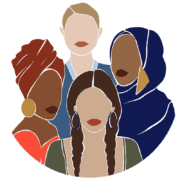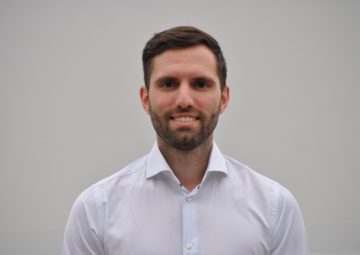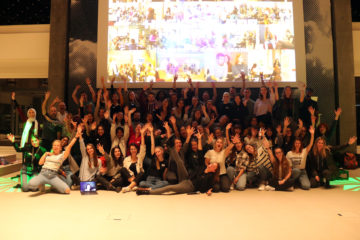Each month we have the honor of interviewing Women Who Inspire Us. This month we talked to Sandra Sulzberger, a passionate and experienced IT consultant and digital transformation expert who works at OIZ (Organisation and Informatics) at the City of Zurich. Sandra studied Computer Science at ETH Zurich in the 1980ies and will be taking us on an impressive journey through her career in IT, reflecting on what has changed since then, and where we still need more mindset shifting to happen.
Tell us a bit about yourself
My name is Sandra Sulzberger, I am 58 years old and I studied Computer Science at ETH Zurich 35 years ago from 1986 to 1992 in one of the first cohorts. Today, I work at OIZ (Organisation and Informatics) at the City of Zurich as a consultant for digital transformation.
When I studied at ETH Zurich, there were 2% women in computer science. Out of 200 students, we were 5 women who started and eventually 2 women that graduated – me and one other woman. My first experience as a student was a lecture by Professor Wirth who entered the room saying “My gentlemen, half of you will not be here after the first pre-diploma”, so it was very clear that the few women around were not even being seen.
I also frankly did not feel addressed by his comment, as I made it through the pre-diploma. The fact that I was one of few women motivated me to always do my best, also because I felt I had to prove myself as a woman in IT. To show the professors and my colleagues that I can do it as well. This ambition resulted in me always being one of the bests in my cohort.
In my career I went away from software engineering into project and people management quite quickly. I also did a second master in coaching and organizational consulting at ZHAW from 2011-2016. Since then I have found my way back first to project management and now I am actually partially back at programming and software engineering. So I did a round trip.
In my current role, I am supporting other departments within the city on their first steps towards digitalisation. There is a big need for digital transformation which I am happy to help support with my expertise.
What triggered your interest in computer science? Was it a difficult decision to study computer science?
A friend of mine from high school was one of the first students who studied computer science at ETH Zurich in the 1980ies. He motivated me by saying that I was smart enough and should try to study computer science. Based on this assessment, I just wanted to try it.
In high school I also did an exchange year in the United States and there, I got to work with computers and started to code. It was such a joy to create something from scratch just by writing code, and building applications with lightness. This was fascinating to me. Until today, I still really love this aspect of my work.
In 1984 there was a sense that computer science could be an interesting and emerging field. My dad actually wanted me to study something more concrete like medicine, he simply did not understand what computer science was all about, but he let me do it anyway. He was very supportive.
I was surprised that there were few women studying computer science, but it never made me question whether I should study it myself or not.

When I studied at ETH Zurich, there were 2% women in computer science.
How was it to study computer science at ETH Zurich 35 years ago?
The first time I realized how much of a challenge it was to study as one of very few women at the ETH, was when I started my minor in philosophy at the University of Zurich. In these lectures, there was an equal distribution between men and women and it felt so different. This was an Aha moment for me, it was such a relief to just feel normal for once.
In my computer science classes, I always felt like I had to prove myself double, especially in front of professors from the older generation. Their attitude towards women was very much shaped by traditional roles based on how they grew up, what we all saw in books and movies: women are here to stay home, cook and serve – that’s it. I always felt this outdated view on gender norms and that as a woman I was not being taken seriously in the IT world because of it.
After the first pre-diploma, my male colleagues were surprised that I got through. With my female colleagues, we made a sport of always trying to be the fastest, for example when putting together computers. This is probably also why I finished my studies „cum laude“, my final grades were really good.
Amongst us women in computer science, we had a very strong bond, also across different years. As a woman, I felt often left out or not taken seriously, for example when it came to finding a topic for a diploma thesis.
Through other women that I knew at the computer department, I got into the robotics department to write my thesis. Otherwise, it might have been difficult for me to find a professor who took me on, I presume. But it ended also very well, I received a silver medal (and this is the highest award at the ETH) for my diploma-thesis on improving fuzzy-logic controllers with neural networks. So we worked on artificial intelligence already 35 years ago, and it was really fun.
This has hopefully changed today. Because the awareness for diversity has increased and professors are being measured by numbers, you might even have a slight advantage as a woman when applying for a thesis. But what has not changed based on my experience is the atmosphere at the ETH, which is still an environment that might keep women out.
I was recently back at ETH Zürich as a coach for a hackathon organized by VIS, the student organization. Today, there are 25% women at ETH Zurich studying computer science, but the culture is still not very friendly for women – or at least it seemed to me like not much has changed regarding this.
There is still a lot of emphasis on competition rather than collaboration. I don’t think this works well for most women – they simply don’t feel well in such an environment. I am also seeing this at work, that there is little focus on collaboration and that women get career advice towards being more assertive and having to stand their grounds – basically mimicking male characteristics.
There is a great book called Reinventing organizations by Frederic Laloux which describes the importance of the cooperation paradigms. We should design a culture around cooperation and collaboration, not around shareholder value. In 1987, around the time when I studied at the ETH, a great German Psychologist, Margarete Mitscherlich wrote: „The future is female.” This future is now. We need women in tech now, more than ever.
I see older generations, especially men, struggling with this mindset shift. Younger generations are already mostly ingrained with new mindsets. Today it needs to be a no brainer, that the female perspective has space. We should not have to discuss it anymore.
Coming back to today: What motivates you at work? Why do you get up in the morning?
Digitalisation is making life and workflows easier for people. I love when repetitive tasks can be automated and people get back time for more important tasks. But repetition is not always bad. In a world where everything is automated, you only need specialists that are handling the special cases which also creates new specialist jobs. But if workers only handle difficult cases, no more easy tasks that can be done in between, then this can also quickly lead to exhaustion or overwhelm. It’s about finding a balance.
I definitely love when I can get something up and running, such as automating annoying administrative processes, and then hearing back from the people using it how it has influenced their every day work in a positive way.
As a consultant I have worked with many different types of organizations, from start-ups to governmental departments. Organizations are on different levels of maturity: in start-ups new paradigms are frequently introduced and there is little stability, in older corporations legacy paradigms are often in the way of change and they tend to be too much occupied with themselves rather than their outcome.
I personally enjoy working in organizations that are somewhere in between, where there is space for new ideas and processes, but there is also some stability.

My daughter is a big role model for me. She is literally reinventing life – not just reinventing organizations.
What has been your toughest challenge you faced while working in tech? What did you learn from it?
My ambition to work double as much to get recognition has often brought me to the edge of exhaustion. I often took over projects in crisis and saw it as a challenge for myself to turn them around. I wanted to prove to others that I could do it, and I successfully finished all of these projects, but I sometimes paid a high price for it.
Luckily, I have a body that clearly signals to me if I am doing too much with back pain. This always forced me into taking the necessary breaks. I remember there was a project to modernize the school administration that I took over which was going on for 10 years before that and I only had 1 year and no more budget to finish it.
I managed it with many tricks such as bringing interns and volunteers on the project, and on the day of the migration after it successfully ran through, I went home and immediately got very strong back pain. It turned out to be a lumbago that knocked me out for a week. I am still proud that I was able to do all these projects, and I probably would do it again, but a little less ambition would have been healthier.
What I learned from it is that sometimes it’s better to say no to projects that have little chance to succeed and will potentially damage your health. I invested a lot of energy into projects and people without always getting enough in return. It is sometimes hard to say whether this was because I am a woman or because I refused to participate in the on-going competition.
From happiness research I learned that money and power does not make you happier. After time, I got wiser and I understood that I don’t need to be always winning this game. Today I know that work and having a successful career is not everything.
In the younger generations I am seeing this mindset much more present. Like my daughter who is 22 years old and after having completed an apprenticeship in structural drafting, she now decided to travel the world instead of going back to working in the construction industry.
Her focus is on living a sustainable life by not owning much. She doesn’t feel like she has to be part of the system, the so-called “hamster wheel” that I was in for such a long time. My daughter is a big role model for me. She is literally reinventing life – not just reinventing organizations.
She always triggers me to rethink whether I really need to do and own more. And whether it is really worth it to work so much.

I am now in my third phase of life with a focus on knowledge transfer, mentoring and supporting younger generations.
Do you act for diversity in tech yourself, and if yes how?
At the City of Zurich, we have a community called WIN (Women Initiative Network) that I am a part of. I was always active in female networks throughout my career, but I have also often stopped being engaged when it was too much about blaming and complaining and not actually solving anything.
I also participated in visiting high schools as part of “Informatiktage”, which was a very nice experience. There was, on purpose, a group of women, who visited the classes to tell them about IT-Jobs. The reactions of the students, especially the female students, were very positive.
They were asking whether as a woman you can work in a technical career and be a mom at the same time, how is the work-life balance, how high are the salaries. When we told them about our jobs, their eyes started to light up, and at least a few of them seemed to see real potential for this job being their future profession.
I try to be a role model for younger women in tech. But I don’t like to call myself a feminist. I perceive feminism as an old and outdated concept. Today we shouldn’t have to discuss it anymore. As a group, we women need to get out of the victim role, and work towards normality. It should just be normal that women and men are treated the same way and that a work environment works both for men and women. But I also feel the changes are too slow.
I am now in my third phase of life with a focus on knowledge transfer, mentoring and supporting younger generations. I am attending hackathons as a coach in order to be consulted for advice, not to steer or lead anything anymore. I realize that it’s time for me to hand over, to let go and to just support the new generations where they need it. I am much more forgiving now, I am tired of proving myself and asking for recognition.
I truly believe that people over 50 should let younger generations lead. We should not be so dominant and take all decisions. We are not fighting for our world anymore, the world belongs to the young generations. “Ok, Boomer” is a reality – we don’t understand everything anymore about the world today. To the extreme, I even believe older generations shouldn’t be allowed to hold political positions or even vote – because the decisions they take will impact a totally different generation of people.

Don’t wait for the praise, demand it and know your worth.
What advice would you give other women in tech?
My advice would be: no matter the issues we are still seeing in this industry, if you want to be a girl in tech, do it anyway! Don’t take too much consideration for others and try to only please people. Stand up for your own needs and get your career in tech even if people think you cannot do it.
In my outdated role as a girl, that I was taught then, I’ve always been serving others with a lot of patience and engagement. But this has also led me to being taken advantage of. For a big part of my career, I was patiently waiting for gratitude to come around eventually, but it never happened.
Don’t wait for the praise, demand it and know your worth. If a project was successful due to your contribution, make sure people know it. I am seeing too often that women are used as ideation givers and servers also in times of crises – and then others use the results for their own praise. Don’t ever let that happen to you.
Thank you Sandra for allowing us to tell your fascinating story and for this trip back in history that gives a lot of opportunity to feel hopeful and to reflect on the challenges that remain. Thank you for being a woman who inspires us! 💛
Author: Lisa Stähli






